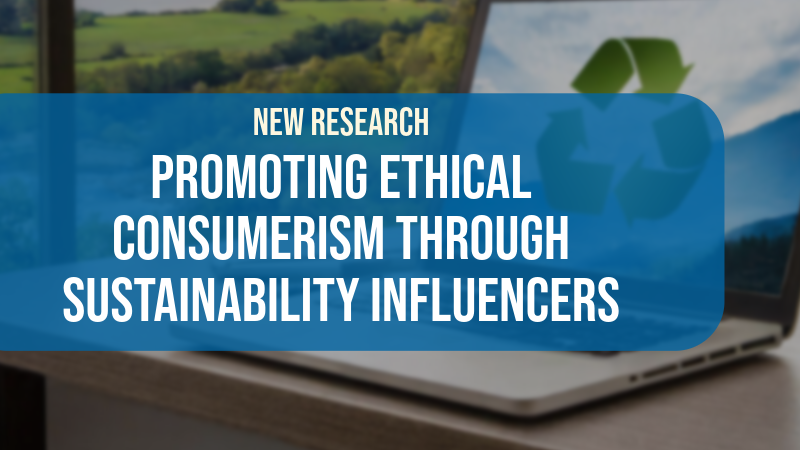The power of sustainability influencers
January 29, 2024

By Hyosun Kim, Indiana State University
There are quite a few influencers on social media identifying themselves as advocates who educate people on how to practice sustainable lifestyles—sustainability influencers. They may not be mega influencers who have millions of followers or make paid sponsorships with big name brands, but they do share information and advice to reduce plastics and carbon footprints with their like-minded followers and educate them on how to protect the environment by encouraging the public to adopt sustainable lifestyles.
Through their daily lifestyle blogs, they show how simple changes at work, at home, and at restaurants when picking up their favorite take-out can help protect the environment, for instance. One fascinating thing about sustainability influencers’ posts and videos is that they offer tips for a sustainable lifestyle genuinely based on their own experience from their daily routine.
Their audiences find the advice easy to follow and relatable, so they want to emulate the sustainable lifestyles shown in sustainability influencers’ posts. My research study was conducted to gain a better understating of these sustainability influencers’ potential as endorsers. Specifically, in order to understand the endorser effects of sustainability influencers, my study examined how organizations can leverage the sustainability influencers’ signature stories to promote their sustainability initiatives when partnering with the influencers, where most organizations primarily highlight their goals and achievements for the initiatives.
In order to investigate the underlying mechanisms of how the sustainability influencers’ signature stories helps encourage people to adopt sustainable lifestyles, an online experiment was conducted. The experiment tested how an influencer’s signature story, which resembles consumer testimonials and follows the structure of the classical drama narrative, affects individuals’ decisions to support a sponsored organization’s sustainability initiative.
The findings showed that sustainability influencers played an important role in encouraging sustainable behavior. In other words, influencers’ sustainable lifestyle stories make people believe that if influencers can practice sustainable behavior in daily life, they can do it, too — following the concept of self efficacy, according to Badura’s social cognitive theory.
When people see the tips for practicing zero waste and reducing carbon footprints demonstrated by fellow consumers like influencers, people are more likely to relate with them strongly, be willing to adopt sustainable lifestyle habits, and share the posts on social media. My study suggests that sustainability influencers serve as exemplars for people to model how to practice sustainable lifestyles, creating greater engagement with promotional posts.
Additionally, the influencer’s signature story itself directly affects people's decision to share sponsored sustainability posts on social media. This means that it is important to create a unique post containing the sponsoring influencer’s expertise and personal stories to promote the organization’s sustainability initiatives effectively. Sustainability influencers might not have large followings or have a lot of fame compared to mega influencers. Instead, they create a community with like-minded people who are connected with each other based on shared interests.
The range of their reach may not be as large, but the impact of the message can be more effective, and their followers will be more responsive to the message because these influencers enhance their followers’ self-efficacy. As the findings show, it is most important to leverage stories told by influencers themselves and incorporate the organization’s sustainability initiatives in the post when partnering with influencers.
In conclusion, organizations can benefit from partnering with sustainability influencers who have built strong reputations among their followers and have the ability to maintain a reputation and trustworthy relationships with fellow consumers. They will serve as successful endorsers. To leverage these influencers' stories, it will be beneficial for organizations to have influencers create their own stories that are uniquely relatable to their audiences.
For further information on this research, please email Kim at hyosun.kim@indstate.edu. This project is supported by the 2022 Page/Johnson Legacy Scholar Grant on sustainability.

